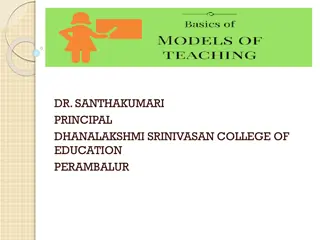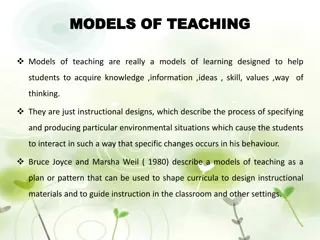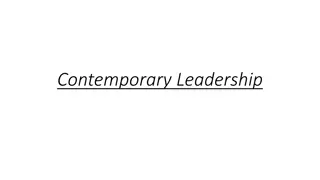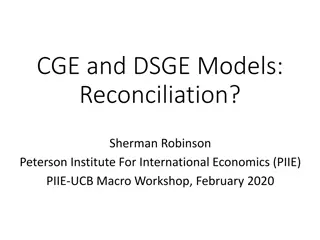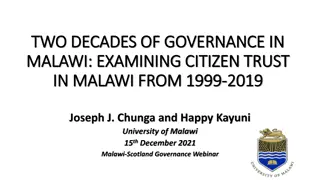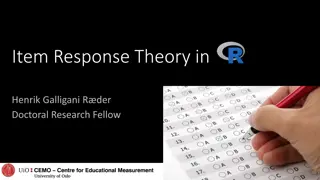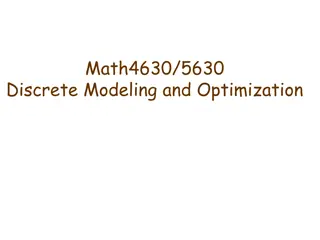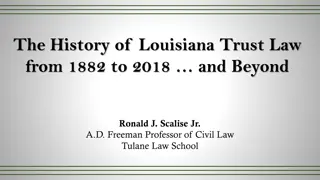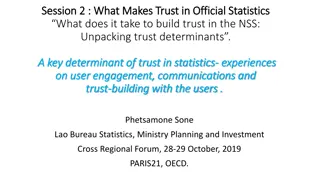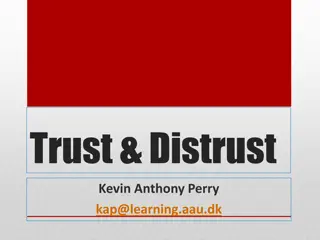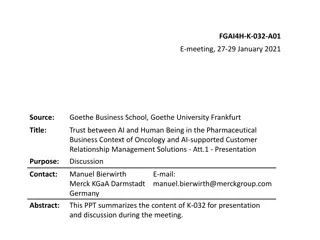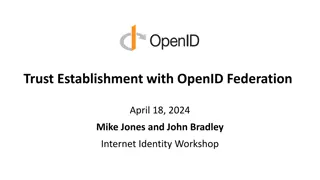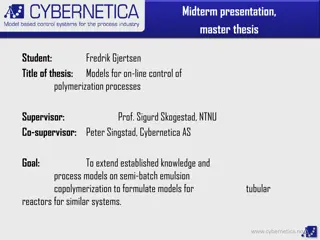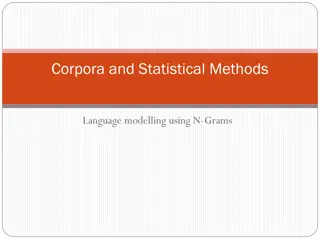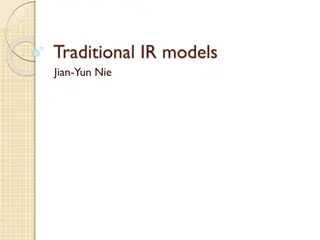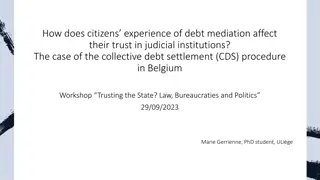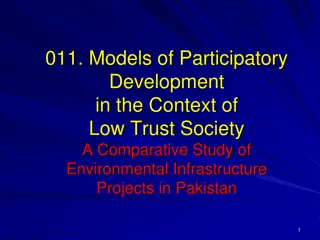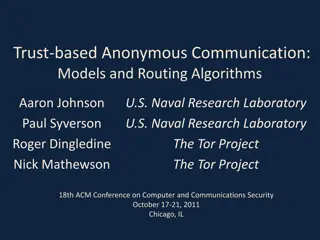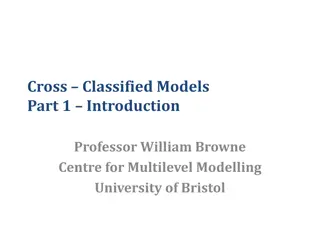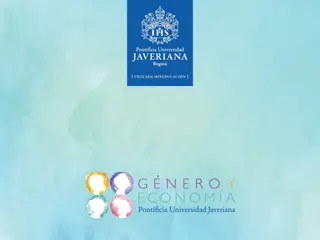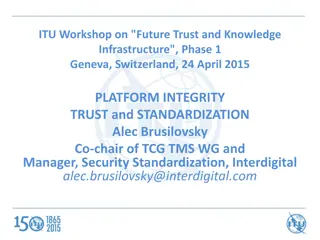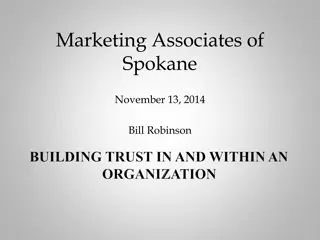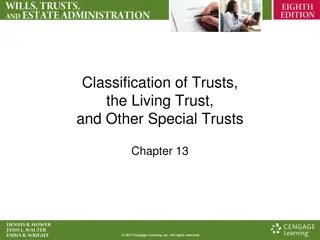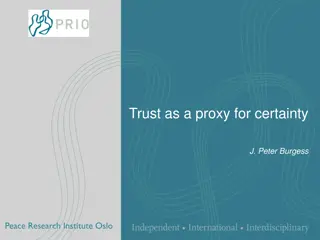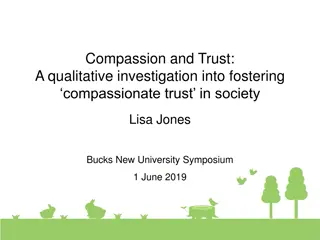Global Climate Models
Scientists simulate the climate system and project future scenarios by observing, measuring, and applying knowledge to computer models. These models represent Earth's surface and atmosphere using mathematical equations, which are converted to computer code. Supercomputers solve these equations to pr
3 views • 15 slides
System Models in Software Engineering: A Comprehensive Overview
System models play a crucial role in software engineering, aiding in understanding system functionality and communicating with customers. They include context models, behavioural models, data models, object models, and more, each offering unique perspectives on the system. Different types of system
2 views • 33 slides
Understanding Input-Output Models in Economics
Input-Output models, pioneered by Wassily Leontief, depict inter-industry relationships within an economy. These models analyze the dependencies between different sectors and have been utilized for studying agricultural production distribution, economic development planning, and impact analysis of i
8 views • 7 slides
Securitization of Covid-19 in Hong Kong: Trust and Success
Analyzing the successful securitization of Covid-19 in Hong Kong amidst low political trust, this study explores the role of trust, smart technologies, and governmental factors in managing the pandemic. Key elements include political trust, audience acceptance, smart technology trust, and effectiven
2 views • 19 slides
Understanding Models of Teaching in Education
Exploring different models of teaching, such as Carroll's model, Proctor's model, and others, that guide educational activities and environments. These models specify learning outcomes, environmental conditions, performance criteria, and more to shape effective teaching practices. Functions of teach
1 views • 20 slides
Understanding Models of Teaching for Effective Learning
Models of teaching serve as instructional designs to facilitate students in acquiring knowledge, skills, and values by creating specific learning environments. Bruce Joyce and Marsha Weil classified teaching models into four families: Information Processing Models, Personal Models, Social Interactio
1 views • 28 slides
Understanding Trust in Contemporary Leadership
Trust is the foundation of effective leadership, comprising elements like integrity, competence, consistency, loyalty, and openness. Trust plays a crucial role in leadership, impacting team performance and cooperation. Different types of trust - deterrence-based, knowledge-based, and identification-
0 views • 9 slides
Significance of Models in Agricultural Geography
Models play a crucial role in various disciplines, including agricultural geography, by offering a simplified and hypothetical representation of complex phenomena. When used correctly, models help in understanding reality and empirical investigations, but misuse can lead to dangerous outcomes. Longm
0 views • 8 slides
Understanding CGE and DSGE Models: A Comparative Analysis
Explore the similarities between Computable General Equilibrium (CGE) models and Dynamic Stochastic General Equilibrium (DSGE) models, their equilibrium concepts, and the use of descriptive equilibria in empirical modeling. Learn how CGE and DSGE models simulate the operation of commodity and factor
4 views • 15 slides
Examining Citizen Trust in Malawian Governance Over Two Decades (1999-2019)
This paper critically analyzes public trust in key government institutions in Malawi from 1999 to 2019, highlighting a general decline in trust levels and its impact on political legitimacy. The study explores factors influencing public trust, such as perceptions of government performance, integrity
0 views • 12 slides
Enhancing Information Retrieval with Augmented Generation Models
Augmented generation models, such as REALM and RAG, integrate retrieval and generation tasks to improve information retrieval processes. These models leverage background knowledge and language models to enhance recall and candidate generation. REALM focuses on concatenation and retrieval operations,
1 views • 9 slides
Understanding Item Response Theory in Measurement Models
Item Response Theory (IRT) is a statistical measurement model used to describe the relationship between responses on a given item and the underlying trait being measured. It allows for indirectly measuring unobservable variables using indicators and provides advantages such as independent ability es
2 views • 32 slides
Evolution of Trust Law in Malta
Malta, with a unique legal system integrating civil and common law concepts, has evolved its trust law over the years. The concept of trust was gradually adopted, culminating in full integration into domestic law post-2004. Recent amendments have further solidified the legal framework, bridging the
4 views • 150 slides
Understanding Discrete Optimization in Mathematical Modeling
Discrete Optimization is a field of applied mathematics that uses techniques from combinatorics, graph theory, linear programming, and algorithms to solve optimization problems over discrete structures. This involves creating mathematical models, defining objective functions, decision variables, and
0 views • 12 slides
Leadership, Trust, and Crisis: Lessons from Central Europe Project
The project funded by multiple governments in Central Europe aims to advance sustainable regional cooperation. The initiative focuses on understanding leadership as a process involving trust, especially in crisis situations. The lesson structure includes case studies, discussions on resources, and e
4 views • 19 slides
Louisiana Trust Law Evolution: 1882-2018 & Beyond
Louisiana Trust Law has a rich history from the early resistance pre-1882 to its evolution over the years. Ronald J. Scalise Jr., a prominent figure in Civil Law, explores the challenges faced and the progression of trust recognition in Louisiana. Discover the pivotal moments in the development of t
0 views • 26 slides
Empowering Patient Safety Partnerships at Solent NHS Trust
Solent NHS Trust prioritizes patient involvement and community engagement to enhance healthcare services across Hampshire, Isle of Wight, Portsmouth, and Southampton. By fostering partnerships with patients, families, carers, and the public, the Trust aims to improve health outcomes, increase satisf
0 views • 17 slides
Building Trust in Official Statistics: Key Determinants and User Engagement
Building trust in official statistics involves unpacking trust determinants, enhancing user engagement, communication, and coordination among NSS producers and users. Legislation, policy alignment with development plans, and engagement with government ministries, private sector, and international pa
0 views • 4 slides
Exploring Trust and Distrust in Social Interactions
Understanding the dynamics of trust and distrust within social interactions is vital for successful service delivery and relationship-building, especially in youth work settings. This case study highlights the complexities of gaining trust, the significance of trusting relationships, and the cultura
1 views • 50 slides
Trust Dynamics in AI-Powered Pharmaceutical Business: A Critical Analysis
Exploring the intricate relationship between AI and human trust in the context of the pharmaceutical industry, this presentation delves into the factors influencing trust dynamics and proposes implementation strategies to foster trust between sales representatives and oncologists in AI-supported too
2 views • 12 slides
Understanding OpenID Federation for Trust Establishment
OpenID Federation enables the establishment and maintenance of trust among parties in multi-party federations, allowing for secure interactions and sharing of information. It defines hierarchical JSON-based trust establishment data structures, applicable to OpenID Connect, OAuth 2.0 deployments, and
4 views • 8 slides
Observational Constraints on Viable f(R) Gravity Models Analysis
Investigating f(R) gravity models by extending the Einstein-Hilbert action with an arbitrary function f(R). Conditions for viable models include positive gravitational constants, stable cosmological perturbations, asymptotic behavior towards the ΛCDM model, stability of late-time de Sitter point, a
1 views • 12 slides
Understanding Wireless Propagation Models: Challenges and Applications
Wireless propagation models play a crucial role in characterizing the wireless channel and understanding how signals are affected by environmental conditions. This article explores the different propagation mechanisms like reflection, diffraction, and scattering, along with the challenges and applic
1 views • 14 slides
Models for On-line Control of Polymerization Processes: A Thesis Presentation
This presentation delves into developing models for on-line control of polymerization processes, focusing on reactors for similar systems. The work aims to extend existing knowledge on semi-batch emulsion copolymerization models, with a goal of formulating models for tubular reactors. Strategies, ba
0 views • 16 slides
Understanding N-Gram Models in Language Modelling
N-gram models play a crucial role in language modelling by predicting the next word in a sequence based on the probability of previous words. This technology is used in various applications such as word prediction, speech recognition, and spelling correction. By analyzing history and probabilities,
0 views • 101 slides
Understanding Information Retrieval Models and Processes
Delve into the world of information retrieval models with a focus on traditional approaches, main processes like indexing and retrieval, cases of one-term and multi-term queries, and the evolution of IR models from boolean to probabilistic and vector space models. Explore the concept of IR models, r
0 views • 65 slides
Trust in Judicial Institutions: Impact of Debt Mediation Experience
Explore how citizens' experiences of debt mediation, specifically the Collective Debt Settlement procedure in Belgium, influence their trust in judicial institutions. The study delves into defining trust, the CDS procedure, research questions regarding interactions with professionals, stigmatization
0 views • 29 slides
Participatory Development and Trust Building in Low-Trust Societies
Models of participatory development in low-trust societies highlight the failure of government-led approaches due to inequalities and distrust between government agencies and communities. Breaking this vicious circle requires establishing equitable partnerships and ensuring equal roles in planning a
0 views • 19 slides
Tapton School Academy Trust - Empowering Learners, Transforming Futures
Tapton School Academy Trust is dedicated to providing a high-quality education experience for over 7,500 learners across 9 schools. With a focus on individual needs, outstanding teaching, and community involvement, the Trust aims to prepare students for successful lives. Through clear leadership and
0 views • 16 slides
Understanding Trust and Equitable Charges in Property Law
Trust and equitable charges in property law involve a legal obligation where the property holder manages the property for the benefit of another person. This trust relationship consists of elements like legal title, trust property, and beneficiaries. The creators of a trust can be referred to as set
0 views • 25 slides
Trust-Based Anonymous Communication Models and Routing Algorithms
This research paper discusses trust-based anonymous communication models and routing algorithms in the context of onion routing, emphasizing the importance of trust in mitigating security risks from adversaries with resources. The paper presents a model of trust and proposes trust-based routing algo
0 views • 65 slides
Understanding Cross-Classified Models in Multilevel Modelling
Cross-classified models in multilevel modelling involve non-hierarchical data structures where entities are classified within multiple categories. These models extend traditional nested multilevel models by accounting for complex relationships among data levels. Professor William Browne from the Uni
0 views • 13 slides
Understanding General Equilibrium Models and Social Accounting Matrices
General Equilibrium Models (CGE) and Social Accounting Matrices (SAM) provide a comprehensive framework for analyzing economies and policies. This analysis delves into how CGE models help simulate various economic scenarios and their link to SAM, which serves as a key data input for the models. The
0 views • 50 slides
Ensuring Platform Integrity and Trust in Cloud Computing Environments
The workshop on "Future Trust and Knowledge Infrastructure" highlights the challenges and importance of maintaining trust and security when migrating network core functionality to the cloud. It emphasizes the need for scalable security controls and standardized measures to protect software component
0 views • 21 slides
Hull and East Yorkshire Hospitals Trust Financial Review 2014/15
Hull and East Yorkshire Hospitals Trust achieved its financial duties in the fiscal year 2014/15, maintaining a surplus for the eighth consecutive year. The Trust's underlying financial position, sources of income, and expenditure breakdown are detailed, showcasing a commitment to sound financial ma
0 views • 10 slides
Trust in Organizations: Building a Culture of Confidence
The importance of trust in businesses is highlighted, with insights on the factors contributing to trust within organizational cultures. Emphasis is placed on clarity of mission, alignment of values, and the balance of competence and character. Understanding evolving trends in trust is crucial for e
0 views • 17 slides
Understanding Composite Models in Building Complex Systems
Composite models are essential in representing complex entities by combining different types of models, such as resource allocation, transport, and assembly models. Gluing these models together allows for a comprehensive representation of systems like the milk industry, where raw materials are trans
0 views • 27 slides
An Overview of Trusts: Classification, Living Trust, and Special Trusts
This comprehensive guide delves into the classification of trusts, including express and implied trusts, active versus passive trusts, cy-près doctrine, inter vivos trust, testamentary trust, and the rule against perpetuities. Explore the nuances and characteristics of each trust type and gain insi
0 views • 19 slides
Trust as a Proxy for Certainty in Social Cohesion
Exploring the intricate relationship between trust, security, and social cohesion, this study delves into how trust serves as a proxy for certainty in uncertain environments. By analyzing societal properties and the role of trust in managing risks and insecurities, the Peace Research Institute Oslo
0 views • 16 slides
Cultivating Compassionate Trust in Society: A Qualitative Exploration
This qualitative investigation delves into the concept of compassionate trust and its role in fostering positive societal interactions. Through a social constructionist lens, the study explores how individuals understand and embody compassionate trust, emphasizing the interconnectedness of compassio
0 views • 16 slides




